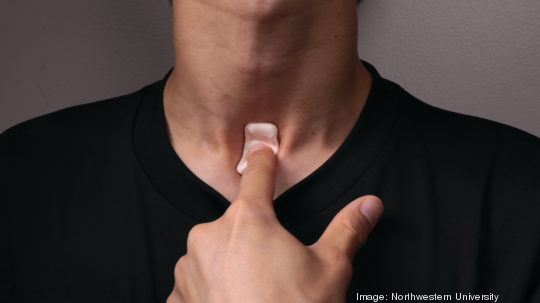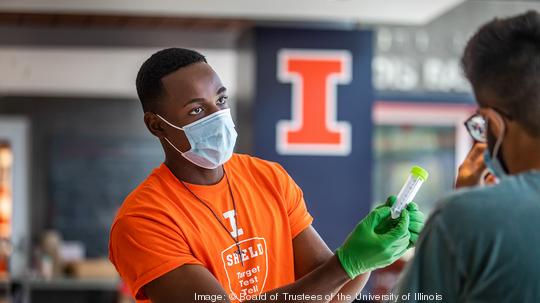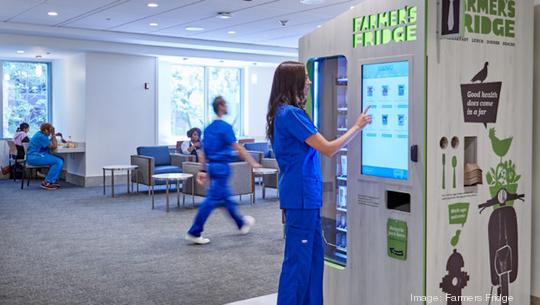As Covid-19 continues to uproot American life, heroes have emerged in the fight against this deadly virus. Doctors, nurses, paramedics and other frontline workers have risked their lives to help improve the lives of others and stop the spread of the coronavirus.
To truly overcome Covid-19, scores of entrepreneurs, tech companies, researchers, community leaders and others have sprung into action to help assist those on the frontlines with the tools and technologies they need—be it a vaccine candidate, a medical device, a new testing technology or better PPE.
These are what we at American Inno are calling Crisis Innovators. A Crisis Innovator is a company or organization that is addressing the virus head-on, with a new invention, tool, product or service that aims to make a positive impact in our fight against the coronavirus.
John Rogers, a Northwestern University researcher who leads an advanced wearable technology lab, said one key aspect of innovating during a pandemic is to provide solutions that the health care industry truly needs, rather than something that gets in the way. During a crisis, time and resources are limited, and new technologies need to quickly prove they’re useful.
“We don’t want to push engineering technology and widgets into a community that’s already stressed and tapped out in terms of bandwidth,” he said.
From a new wearable device developed by Rogers that monitors Covid symptoms, to a groundbreaking testing system at the University of Illinois, to a device to better disinfect PPE, here are six Crisis Innovators to know in Chicago.
A high-tech Covid detector
John Rogers, a researcher at Northwestern's McCormick School of Engineering, and his team have been developing high-tech wearable devices that go well beyond the capabilities of a FitBit or Apple Watch. The group’s wireless devices have helped patients monitor neonatal and fetal health, helped stroke survivors monitor their speech, and even created a high-tech sweat monitoring patch that was worn by Serena Williams in a Gatorade commercial.
But as Covid-19 began to spread throughout the U.S. in March, the Chicago medical community reached out to Rogers to see if his team could assist in the effort to combat the virus. The lab took its existing device that assists in the rehabilitation of stroke survivors and redesigned it to monitor Covid symptoms.
The resulting product is a small wearable patch that’s worn on a person’s neck that can catch early signs of the coronavirus. It uses artificial intelligence to detect suspicious coughing and respiratory activity that could suggest a person has coronavirus, monitoring coughing intensity and patterns, chest wall movements, irregular breathing, respiratory sounds, heart rate and body temperature.

The team made around 100 devices that were deployed to the Shirley Ryan AbilityLab and Northwestern Memorial Hospital, where both patients and frontline workers like doctors and nurses have worn the device. Its goal is two-fold: to catch early signs of Covid on frontline workers, while also measuring the trajectory of the virus on a patient and determine how it’s developing.
The device has received funding from the National Science Foundation, and the group has a contract with the Department of Defense to deploy to military personnel by the end of September, Rogers said. They also have a deal with a large medical insurance company that plans to use the device on customers in their homes. Rogers said the device is also being deployed in Africa through the Bill and Melinda Gates Foundation.
“We’re excited to have an opportunity to contribute our expertise (to fight Covid),” Rogers said. “To the extent that we can help out, we drop everything to do that."
A testing kit to get thousands of college students back on campus
The return to school has been a major obstacle for universities across the country. But at the University of Illinois, a groundbreaking Covid-19 test is helping tens of thousands of students and faculty return to campus and could soon be used across the country.
Developed by university researchers this spring, the testing is done via saliva, rather than a nasal swab. The test, called I-COVID, yields results in a matter of hours even at high testing volumes. Earlier this month the test received emergency approval by the U.S. Food and Drug Administration, which will allow the test to be used more broadly.

“This pioneering technology is a game-changer that will help safeguard lives and livelihoods across the country,” Tim Killeen, the president of the University of Illinois System, said in a statement.
The university of Illinois has performed more than 60,000 tests on its students and faculty members since it was implemented in July. During that time, the positivity rate dropped from about 1.5% to below 0.2%, the university said.
The university added that on-campus tests processed at U of I now account for around 1-2% of the total daily Covid-19 tests conducted in the U.S.
An online marketplace for PPE
As Chicago businesses like coffee shops, restaurants, salons and hotels began to reopen in early June following Covid-related shutdowns, many small businesses lacked the necessary PPE and other equipment to safely reopen their doors. To help companies access needed supplies like hand sanitizer, masks and protective barriers at affordable prices, Chicago startup Rheaply answered the call.
The startup, which specializes in recycling and sourcing unused items, partnered with the City of Chicago in May to launch the Chicago PPE Market: an online platform where companies could connect with a network of local manufacturers and suppliers that provide PPE supplies.
The goal was to help small businesses, who were already hurting from the impacts of the virus, find affordable protective supplies to help them reopen. The marketplace also offered suppliers a new revenue stream and a way to connect with customers in need.
Thousands of Chicago businesses signed up for the service within the first 48 hours, and close to $100,000 worth of products has been added to local small businesses, Rheaply Chief of Staff Garr Punnett said.
Punnett said Rheaply was able to serve a major need in the supply chain as companies needed PPE but didn’t know where to turn, and manufacturers didn’t know how to find customers.
“What we ended up finding was that there was no formal marketplace—there was no place for people to sell those goods and that’s what we were helping those suppliers create,” he said.
A better way to disinfect your mask
A key element to stopping the spread of the coronavirus is effective PPE. And to make sure masks are properly sanitized and available for reuse by health care workers, a team of researchers at the University of Chicago have discovered a better way to decontaminate N95 masks using ultraviolet light.
Peter Eng, an experimental physicist and research professor at UChicago, created an N95 respirator decontamination cabinet that fixes a specific blind spot of Ultraviolet C, a wavelength of light that’s become a preferred solution for disinfecting PPE. Traditional UV systems cast shadows, which leave parts of the mask’s surface in the dark and unable to thoroughly be disinfected.
Eng’s system uses a UV lamp setup that eliminates shadowing and optimizes the dose to all surfaces of the mask, according the UChicago.
The cleaning system is in use at the hospital at the University of Chicago, and the team is working with the Polsky Center for Entrepreneurship and Innovation to scale the technology.
The system today can fully disinfect 180 masks per hour, but the researchers believe it could eventually be scaled up to process up to 1,440 masks per hour.
A (healthy) vending machine for doctors and nurses
In the early months of the pandemic, as the virus overwhelmed hospitals and put America’s doctors and nurses on the frontlines of the fight, health care workers faced a pressing need: access to quick, healthy meals.
Cafeterias at many hospitals shut down or greatly reduced their operations as the virus intensified, meaning the food options for health care workers were limited. To help doctors and nurses get access to nutritious food in between shifts, Chicago startup Farmer’s Fridge brought its healthy vending machines to hospitals.
The startup, whose machines are typically placed in office buildings, airports and other high-traffic areas, shifted its focus to hospitals, putting machines in more than 140 facilities in places like Chicago, New York, New Jersey and Indianapolis. In May, the company said it was serving more than 30,000 meals per week to health care workers.

The move was a necessary pivot for Farmer’s Fridge, which could no longer rely on office building foot traffic with many companies shifting to work from home. But CEO Luke Saunders said the company also felt called to give back to those working the hardest to stop the spread of the coronavirus. Farmer’s Fridge also installed mini-fridges in hospital break rooms and family bereavement lounges, where food was offered for free.
A 5-minute Covid test
By the end of March, North Chicago-based Abbott Labs had produced a coronavirus test that could produce results in as little as five minutes. Abbott said at the time that it was the fastest available molecular point-of-care test that could detect the coronavirus. It received emergency authorization from the U.S. Food and Drug Administration, and was lauded by officials including Gov. J.B. Pritzker and President Donald Trump.
The device, called ID NOW, weighs just 6.6 pounds and is roughly the size of a small toaster. The portable device has been used in urgent care clinics, hospital emergency departments and physicians' offices, and Abbott has shipped 7 million ID NOW tests to all 50 states.
However, Abbott’s device has come under some scrutiny for accuracy concerns, and the FDA announced in May that it was working with Abbott to investigate the cause of the inaccuracies. The FDA said it “received 15 adverse event reports about the Abbott ID NOW device that suggest some users are receiving inaccurate negative results.”
Update: On Wednesday, Abbott announced a new reliable, portable Covid-19 testing device. The device, called BinaxNOW, provides results in just 15 minutes and costs only $5. The company said it plans to ship "tens of millions of tests in September," and will ramp up to 50 million tests a month at the beginning of October.



